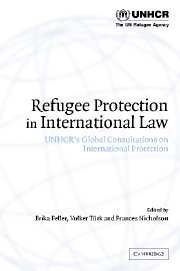Book contents
- Frontmatter
- Contents
- List of annexes
- Notes on contributors and editors
- Foreword
- Preface
- Acknowledgments
- Expert roundtables and topics under the ‘second track’ of the Global Consultations
- Table of cases
- Table of treaties and other international instruments
- List of abbreviations
- Part 1 Introduction
- Part 2 Non-refoulement (Article 33 of the 1951 Convention)
- Part 3 Illegal entry (Article 31)
- Part 4 Membership of a particular social group (Article 1A(2))
- Part 5 Gender-related persecution (Article 1A(2))
- Part 6 Internal protection/relocation/flight alternative
- Part 7 Exclusion (Article 1F)
- Part 8 Cessation (Article 1C)
- 8.1 Cessation of refugee protection
- 8.2 Summary Conclusions: cessation of refugee status, expert roundtable, Lisbon, May 2001
- 8.3 List of participants
- Part 9 Family unity (Final Act, 1951 UN Conference)
- Part 10 Supervisory responsibility (Article 35)
- Index
8.1 - Cessation of refugee protection
Published online by Cambridge University Press: 28 August 2009
- Frontmatter
- Contents
- List of annexes
- Notes on contributors and editors
- Foreword
- Preface
- Acknowledgments
- Expert roundtables and topics under the ‘second track’ of the Global Consultations
- Table of cases
- Table of treaties and other international instruments
- List of abbreviations
- Part 1 Introduction
- Part 2 Non-refoulement (Article 33 of the 1951 Convention)
- Part 3 Illegal entry (Article 31)
- Part 4 Membership of a particular social group (Article 1A(2))
- Part 5 Gender-related persecution (Article 1A(2))
- Part 6 Internal protection/relocation/flight alternative
- Part 7 Exclusion (Article 1F)
- Part 8 Cessation (Article 1C)
- 8.1 Cessation of refugee protection
- 8.2 Summary Conclusions: cessation of refugee status, expert roundtable, Lisbon, May 2001
- 8.3 List of participants
- Part 9 Family unity (Final Act, 1951 UN Conference)
- Part 10 Supervisory responsibility (Article 35)
- Index
Summary
Introduction
The experience of being a refugee can be a defining moment in a person's life, but refugee status is not necessarily intended to be permanent. The cessation of refugee protection poses policy and administrative challenges for States and the Office of the United Nations High Commissioner for Refugees (UNHCR), as well as risks for refugees.
The cessation clauses of the 1951 Convention Relating to the Status of Refugees and parallel provisions in other international refugee instruments were long neglected as a subject of refugee law. In recent years, several developments have increased interest in their interpretation and application. These factors include: democratization in some formerly repressive States; a concern to prevent asylum from becoming a backdoor to immigration; experiments with temporary protection during mass influx; a stress upon voluntary repatriation as the optimal durable solution to displacement; the development of standards for voluntary repatriation; frustration with protracted refugee emergencies; and dilemmas posed by return to situations of conflict, danger, and instability. Cessation occurs in several distinct situations, and refugees may be placed at risk if important distinctions are overlooked.
Section II of this paper focuses on ‘ceased circumstances’ cessation under paragraph 6(A)(ii)(e) and (f) of the UNHCR Statute, Article 1C(5) and (6) of the 1951 Convention, and Article I.4(e) of the 1969 Organization of African Unity Convention Governing the Specific Aspects of Refugee Problems in Africa.
- Type
- Chapter
- Information
- Refugee Protection in International LawUNHCR's Global Consultations on International Protection, pp. 491 - 544Publisher: Cambridge University PressPrint publication year: 2003
- 4
- Cited by



